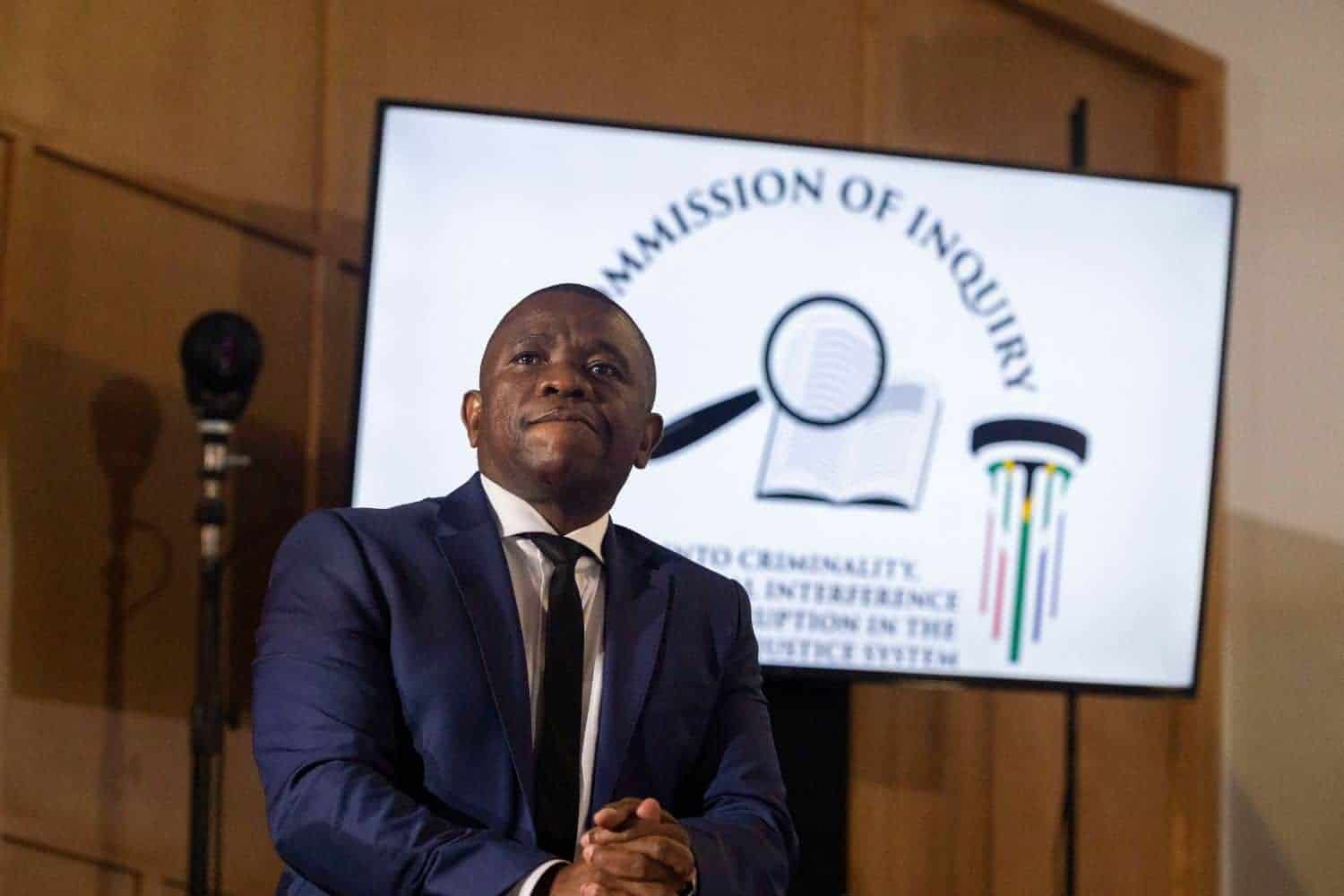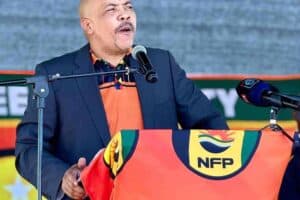Mkhwanazi also accused former police minister Nathi Mthethwa of trying to stop disciplinary proceedings against Richard Mdluli

KwaZulu-Natal (KZN) police commissioner Nhlanhla Mkhwanazi has defended the military-style uniform he wore on the day he made explosive allegations about law enforcement.
On 6 July, Mkhwanazi appeared in the official camouflage of the South African Police Service (Saps) special force task team, flanked by armed officers at a press conference where he implicated Police Minister Senzo Mchunu, senior officers, and members of the judiciary in organised crime.
While his allegations prompted the establishment of the Madlanga commission to investigate claims of political interference, corruption and collusion in the criminal justice system, his attire also sparked a debate over the militarisation of the police.
Mkhwanazi defends uniform at Madlanga commission
Testifying before the commission on Friday at the Brigitte Mabandla Justice College in Pretoria, Mkhwanazi explained why he chose to wear the uniform of the unit in which he once served.
He denied breaking protocol by holding the 6 July media briefing, saying he and his colleagues wanted to present themselves as a “force” rather than a “service provider”.
“The threat, the enemy that we saw is infiltrating Crime Intelligence, is infiltrating Parliament and is controlling our executive authority and is going into the heart of police operations, which is investigations,” Mkhwanazi said.
“You really realise that you can no longer wear a tie and face this fight,” the commissioner continued.
ALSO READ: Bombshell at Madlanga commission: Mkhwanazi accuses DA MP of breaking the law
He said the deep-rooted corruption left him no choice but to draw on tactics he learned in the special task force.
“How do you deal with a terrorist? Because as I see it now, I think this is terrorism.
“These are people who want to take over government not through the ballot paper, but through these criminal activities,” Mkhwanazi told the Madlanga commission, adding that such criminality “cannot happen under our name”.
Watch the Madlanga commission below:
‘I don’t sneak up on a person’
Mkhwanazi further explained that the press conference was also meant to send a clear signal.
“We wanted to communicate a message to these drug squads, politicians, the executive, police officers within law enforcement agencies that we ready for them. I knew that I have a target on my back,” the commissioner said.
He added: “Maybe you’ll forgive me in saying this, but as a Zulu man, angim’nyonyobeli umuntu, ngimqonda ngqo (I don’t sneak up on a person, I faced them directly),” Mkhwanazi said.
READ MORE: Dodgy calls and shielding officials? – Mkhwanazi’s shocking claim against Bheki Cele
Former judge and commission chairperson Mbuyiseli Madlanga later asked if the media briefing was “a show of force”.
Mkhwanazi agreed but added that “it goes beyond that”.
“You have to win a psychological warfare and you need to win a physical warfare,” Mkhwanazi responded.
He stated that the media briefing, in his view, exerted enough pressure for the widely discussed 121 shelved dockets to be brought back to the police.
“That press briefing put pressure to the people that were blocking these investigations that were happening.”
Allegations of political interference by Mthethwa
Earlier, Mkhwanazi said the current interference within Saps reminded him of his tenure as acting national police commissioner between October 2011 and June 2012.
He accused former police minister Nathi Mthethwa — now South Africa’s ambassador to France — of attempting to stop disciplinary proceedings and the prosecution of former Crime Intelligence head Richard Mdluli after the National Prosecuting Authority (NPA) controversially withdrew his fraud and corruption charges in December 2011.
Mkhwanazi described the withdrawal, later overturned in 2013 by a court challenge, as “bizarre”.
He recounted being summoned by Mthethwa to his home in Waterkloof, Pretoria, after he refused to retract a letter from the late former Inspector-General of Intelligence, Faith Radebe, advising that Mdluli’s charges be reinstated.
READ MORE: Mkhwanazi: ‘Brown Mogotsi knew about task team disbandment and 121 dockets before me’
Radebe was present at the meeting.
“The minister didn’t want to hear any of it. He simply said we must stop prosecuting Mdluli and stop the disciplinary case.
“If you talk about political interference, that was the worst that I ever experienced. At that time, I came from the specialised operations; the only thing I know is to chase criminals.
“I am promoted to become the acting national commissioner, and I am confronted with this in front of me, and I say, but this is not what I signed up for when I joined the police.
“This can’t be right. The minister can’t give me these instructions,” Mkhwanazi said.
‘I’m done’
Mkhwanazi told the commission he felt Mthethwa had no authority to issue such instructions.
“I said to the minister maybe you brought me to this position and you thought you are going to use me as a pawn, because perhaps of my age or whatever, but you are wrong, I’m not going to do that.”
According to Mkhwanazi, Mthethwa responded by saying that Mkhwanazi had been appointed by then-president Jacob Zuma.
Mkhwanazi said Mthethwa then instructed Radebe to put in the order to stop the Mdluli investigation in writing.
“So I took that [letter] and I walked, contacted the president and told him that I’m done acting [as the national police commissioner].”
He said Zuma later appointed Riah Phiyega as national commissioner, while he was left “to go sit at home in Montana for the whole year, which was fine”.
NOW READ: Mkhwanazi flags MP’s alleged reckless use of classified information






